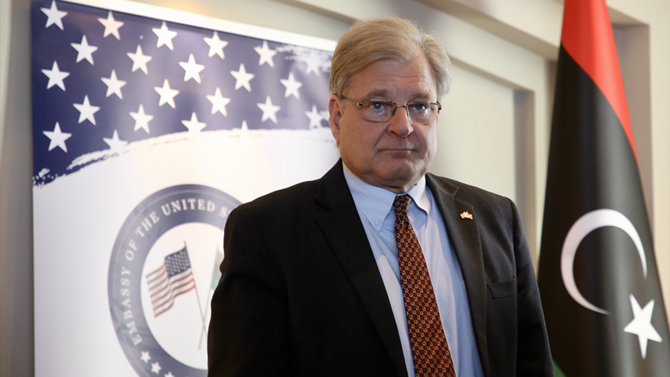CHICAGO: The formation of a unified government in Libya would help accelerate relief efforts in the aftermath of devastating floods that killed nearly 15,000 people in the county last month, the US ambassador to Libya, Richard Norland, said on Thursday.
Storm Daniel caused widespread destruction when it hit the east of the country on Sept. 10. The worst-hit location was Derna, where two dams collapsed and the released water destroyed part of the city. The US has been the largest donor to the international relief efforts that followed.
The storm that was the catalyst for the disaster is blamed on the effects of global warming, but it has also sparked a wider, renewed discussion about the growing need to reunite the divided country and create a road map for democratic elections that can establish a unified government, according to Norland.
Libya has been engulfed by political turmoil and national divisions since the 2011 Arab Spring protests that led to the overthrow and killing of Muammar Qaddafi, who had ruled the North African nation for 42 years.
The nation is split between two rival governments that are backed by armed militias and international patrons. In the west of the country, Prime Minister Abdul Hamid Dbeibah heads the internationally recognized Government of National Unity. In the east, Prime Minister Ossama Hamad heads the Government of National Stability, backed by powerful military commander Khalifa Haftar’s Libyan National Army.
“Perhaps it is not by coincidence, but the discussion around reconstruction has also generated renewed debate and focus on electoral laws and the formation of an agreed caretaker government that would lead the country to elections,” Norland said during his briefing on Thursday, attended by Arab News.
There are concerns about funding for relief efforts and humanitarian aid actually reaching those most in need, he added, and moves to bring the divided country back together would help to ease them.
“We hope to see more progress in the coming days and weeks on a pathway to elections and concerted efforts to reconstruct and assist the people of Derna and eastern Libya,” Norland said.
But he added: “I don’t think that anybody believes that will happen overnight.”
Norland said US officials have spent weeks in Libya assessing the country’s needs in support of the international flood-relief effort. He and Gen. Michael Langley, the commander of US Africa Command, visited Tripoli and Benghazi on Sept. 20 and 21 “for meetings with Libyan military and political leaders to reiterate the importance of east-west cooperation in Libya to the long-term recovery and stabilization of the country.”
The international community is looking for a credible road map to elections in the country, Norland said, with the full engagement of all factions and key leaderships including the eastern-based House of Representatives; the High State Council, an advisory body formed under the terms of the 2015 Libyan Political Agreement; the Presidential Council; the Government of National Unity; and the Libyan National Army.
“Over the span of visits to Libya by myself and Gen. Langley, the United States airlifted more than 29 metric tonnes of critical life-saving humanitarian supplies to Benghazi to support the most urgent needs in flood-affected communities,” Norland said.
“We also discussed the urgent need for further progress in the political process, aiming to reach the stage of elections and the formation of a unified government capable of effectively serving all of the people across the country in the wake of this crisis.
“So, indeed, in addition to the immediate humanitarian relief needs of the people in flood-affected areas, a unified national mechanism is required to effectively and efficiently implement reconstruction efforts.”
The US, along with France, Germany, Italy and the UK, has endorsed a UN call for a “unified national mechanism” that can coordinate with local, national and international partners to help deliver relief as part of a transparent and accountable response to aid and reconstruction needs in Libya.
“Unifying relief efforts responds to the demands of the Libyan people and is crucial to facilitate additional support and technical assistance from both the United States and other international. Partners,” Norland said.
America has been the largest donor in the response to the flooding, he added, and the tragedy has created an opportunity for all sides to recognize that they must work together to move forward through a process of political consensus.
“In response to what has happened, the United States has committed $12 million in humanitarian aid, and a program of diplomacy, development and defense engagement, which are ongoing,” Norland said.
“We are the largest donor to the humanitarian response for people affected by the floods in Derna and eastern Libya. Our embassy declared a disaster emergency on the day of the flood, and USAID’s (the US Agency for International Development) Tunis-based director from the Disaster Assistance Response team was activated on Sept. 13 and continues to coordinate with humanitarian partners and Libyan officials across the country to deliver support.”
Norland touched briefly on questions about efforts by Russia to engage in the relief effort in the country. He noted that the controversial Russian state-funded private military company Wagner Group is operating in Libya and said it had “contributed” to the divisions and problems there. But he added that it is up to the Libyan people to “decide for themselves” whether or not Russia can be helpful to them.
The US will support Libya in its efforts to unify its military and government to help ensure the most effective international response to the humanitarian crisis in the country, he added.




























